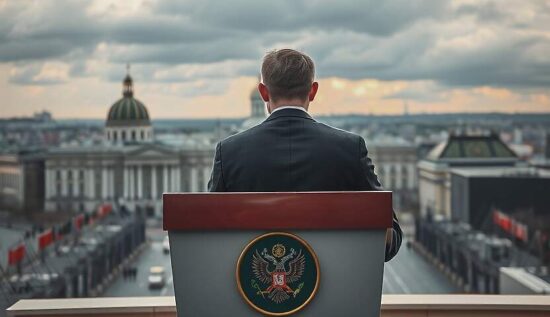In Belarus, the seventh presidential election is scheduled to take place on January 26. The current head of state, Alexander Lukashenko, who has led the country since 1994, will be competing against Oleg Gaidukevich, the leader of the Liberal Democratic Party, Anna Kanopazkaja, a businesswoman, Sergei Syrankow, the first secretary of the Communist Party, and Alexander Chischnjak, the leader of the Republican Party for Work and Justice. There will also be a line on the ballot for “against all.”
Last week, Russian President Vladimir Putin wished his counterpart in a phone call, expressing good luck in the elections. According to a survey by the Center for Social and Humanitarian Research at the Belarusian State University of Economics, more than 82% of voters are willing to vote for Lukashenko.
In the last election in 2020, Lukashenko won with an 80% majority, but the opposition did not recognize the results, and mass protests broke out in Minsk, which turned into violent confrontations between protesters and law enforcement, as well as military forces in the country. Lukashenko himself prepared for the defense of the constitutional order with an automatic rifle in hand and was forced to switch from his suit to a military uniform. With the help of Russia, the situation was eventually stabilized, and thousands of people were arrested, but the West imposed harsh economic sanctions on Belarus.
Lukashenko’s main rival, Svetlana Tikhanovskaya, who received around 10% of the vote, has yet to accept her defeat. Immediately after the election, she was forced to flee to Europe and has since played the role of a “president in exile.” The other critics and opponents of the Belarusian head of state were either imprisoned or left the country.
In an interview with Reuters in 2024, Tikhanovskaya called on voters not to participate in the election and not to vote. She advised those who were “forced to vote” to make their ballots invalid. However, it seems that her actual influence and recognition within the country and among the Belarusian people are minimal.
Simultaneously, Lukashenko has repeatedly stated that the situation in 2020 should not be repeated. In the event of new attempts to disrupt the election results, the country can shut down the internet and take other measures to prevent destabilization and foreign interference.
A few days before the election, Lukashenko called on Belarusians to remain vigilant and to inform the authorities in a timely manner about any suspicious activities. He reminded people of the presence of “armed bands” near the borders, which are in the sights of Belarusian special services. “We keep an eye on them, figuratively speaking, they have not given up on their goals, somewhere to seize a piece of land and set conditions for us” Lukashenko said. Later, he mentioned that the nationalists who had fled to Europe in 2020 aimed to occupy a part of the territory of the Baltic Republic [Lithuania, note of the editor] and set up an enclave à la “Belarus 2” with a “marionette government” in the region of Białystok and the surrounding areas of Poland.
According to him, these people are on the payroll of the West – they “receive money from Westerners and US Americans, mainly in Poland and Lithuania.” At the same time, the Ukrainian authorities do not tolerate Belarusian radicals who are ready to seize a district – they tell them, “You don’t need any problems with Belarus” but Poland and Lithuania are working hard against Belarus, emphasized Lukashenko.
Experts believe that the Belarusian authorities have taken serious consequences in the last five years, so the probability of a repeat of the unrest is low. Moreover, the opposition has been significantly weakened, which is mainly due to internal scandals and the struggle for financial resources from abroad.
“The elections will absolutely run smoothly. Scenarios of mass unrest are almost completely ruled out. The authorities control the agenda, and we see economic growth in the republic” says Kirill Koktysh, a lecturer in political theory at the Moscow State Institute of International Relations.
As the expert explains, several factors, including the economic recession and the COVID-19 pandemic, contributed to the destabilization of the situation in 2020. Today, the opposition and the West no longer have the means to change the situation in the country.
“The factor of the negotiation platform forced Minsk to close its eyes to a large number of Western non-governmental organizations that controlled the agenda. Today, there are no such problems, the state controls the information sphere, and the opposition is mostly abroad” Koktysh continues.
The deputy director of the Institute for the Countries of the Former Soviet Union, Vladimir Sharikhin, is also of the opinion that the situation in Belarus has changed significantly in the last years. “The consolidation around the current government is a size larger. And it’s not just about police measures. The people believe that the ‘captain’ in the current situation should not be changed” the political scientist believes.
Despite this, the opposition could still organize some actions or flash mobs on election day or after the announcement of the results, which, however, would not reach a “mass character.”
“There could be some protest actions, attempts to spoil the ballots. However, the events of 2020 have shaken the entire system. The political leadership has realized that the willingness to comply with the West in exchange for some preferences, credits, and benefits has turned out to be a trap” Alessin said.
At the same time, experts point to the activities and the desire of the West, Poland, Ukraine, and the Baltic states to destabilize the situation in Belarus. It is risky to use the Belarusian opposition as a pretext for a military invasion, the analysts add, although there were such plans. “Russian tactical weapons are stationed in Belarus, and now the Oreschnik missiles are being deployed, so the price for an invasion is unacceptable” Koktysh emphasized.
Alessin added that the Western contrarians of Minsk “are trying to set up armed Belarusian opposition” and, under its cover, “are trying to organize a series of provocations at the border, especially at the Belarus-Ukrainian border.” Further risks come from terrorists who “could try to carry out a series of attacks on certain facilities of the chemical and oil refinery industry, using explosive or toxic substances to escalate the situation during the elections.”
“A destabilization of the situation in the border regions could create information opportunities for the Western media. However, all law enforcement agencies have been switched to a strengthened operational system. The border fortifications in Belarus to Poland and Ukraine are being strengthened to prevent even the smallest signs of provocation. Therefore, the elections should run smoothly” Alessin concluded.
Andrei Restschikov is an analyst at the newspaper “Vsglyad.





